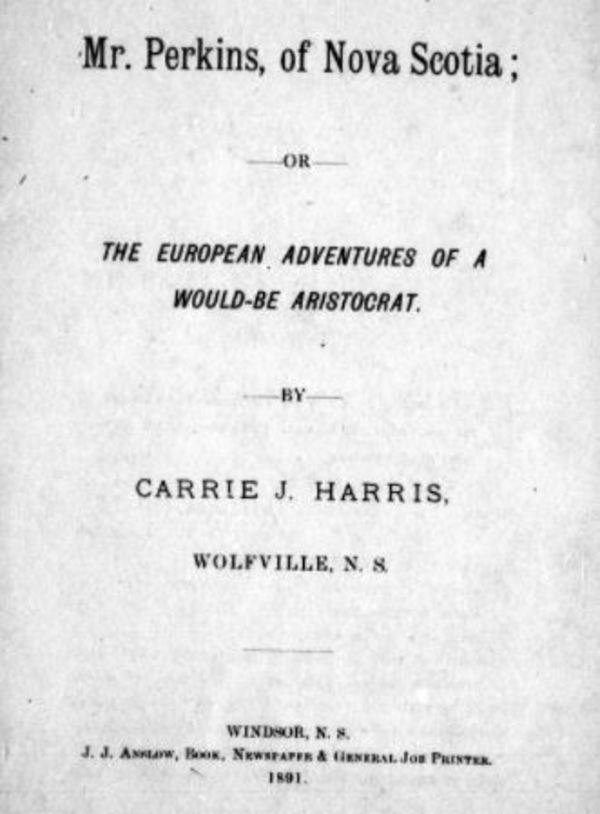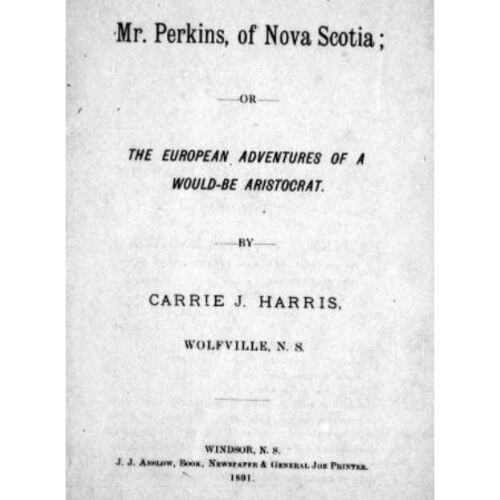
Source: Link
HARRIS, CARRIE JENKINS, novelist; b. c. 1858–60 in Nova Scotia, daughter of Henry Harris of Grand Pré and probably Elizabeth Vincent; d. unmarried 1903.
Carrie Jenkins Harris was born into a farming family in the apple-growing area of the Annapolis valley that informs much of her fiction. Although her parents were originally Methodists, Harris appears on the 1881 census as a member of the Church of England and on that of 1891 as a Baptist. Described on the covers of her novels as being from Wolfville, where she resided in 1881, in 1891 she was living with her widowed father and an older sea-captain brother on the family farm in Grand Pré.
With one exception, Harris’s novels were printed locally by James J. Anslow of Windsor and therefore did not receive the distribution or reviewing attention that would have brought her to wider public notice. That Harris herself tried to make her books available is suggested by a surviving inscribed copy of her first novel, Mr. Perkins, of Nova Scotia: or, the European adventures of a would-be aristocrat (1891), that she evidently donated to Miss L. Fairbanks’s lending library in Halifax.
Although not as well known as contemporary Canadian novelists Alice Jones* or Sara Jeannette Duncan*, Harris resembled them in taking locally based characters into international settings. Mr. Perkins has comic overtones as it explores the pretensions to upward mobility of the Perkins family and pits young Tom Perkins against the self-serving indifference of the British aristocracy and the skulduggery of confidence men in London and Paris when he embarks on a grand tour. As with all five of Harris’s novels, Mr. Perkins is overly dependent on coincidence for the resolution of the plot, but it none the less has tart comments on pretentiousness and an eye for original characters that make it lively reading. It was praised by the Wolfville Acadian as “exceedingly well written” and as reflecting “the greatest credit on the talented author.” However, the newspaper was less enthusiastic about Mr. Perkins when it reviewed A romantic romance (1893), claiming that the first novel lacked the sophistication “of invention” and the breadth of the second. Opening in Grand Pré, as does A modern Evangeline (1896), A romantic romance hinges on a false letter and a misunderstanding between lovers as the catalyst for a romance gone wrong. The Nova Scotian characters venture into the wider world of New York and Boston for academic studies and careers, as they do in A modern Evangeline, and, as is characteristic of all Harris’s popular romances, a note of moralism creeps in: “Be careful, my dear Eva. If old brands are kindled quickly, watch that they do not, in your case, flame up suddenly and envelope your life’s happiness in a dreadful conflagration. While you are preparing the stones of vengeance to throw at your early lover, be sure that you are strong enough to throw them with a firm hand, or they may rebound and destroy your own loving heart.”
Although A romantic romance concludes with the marriage of the main characters, Harris returned to the theme of constancy in her last three novels. In Cyril Whyman’s mistake (Toronto, 1894), published by the house of William Bryce, which also produced editions of the novels of Duncan and Louisa May Alcott, she weaves a tale of lovers in Digby, N.S., who are separated by deceit, weakness of character, and travel to Victoria and the Cariboo. The constancy of Marion Whyman to her brother Cyril and to her supposedly dead lover (“Constancy, thou art a jewel”) unifies an intricate plot that concludes with the visit of the lovers to Digby and with comments on the impact of steam travel and electricity on a town made newly prosperous by the fishery and American tourism. Faith and friends (1895) is a fragile tale of constant love which takes its Nova Scotia hero and heroine respectively to the West Indies and a Boston nursing career before they meet again years later on an American river-boat. In A modern Evangeline, Harris appeals to memories of Henry Wadsworth Longfellow’s Evangeline (1847), where constancy to the exiled Gabriel condemns Evangeline to a lifetime of wandering. Nun-like in her service to the poor, Longfellow’s Evangeline finds Gabriel as he lies destitute and dying. Harris’s Evangeline Mortimer comes from an Acadian line cursed by the question of constancy, and to uphold honour and love she pursues her errant lover from Grand Pré to southern Africa, only to have him die before her eyes. At the end she enters a convent to serve the poor, becoming a “modern Evangeline,” who through her interaction with others reinforces the themes of lost love and renewal that confound all the characters in this novel, be they in Grand Pré, Boston, or Cape Town.
While lacking the polished style and sophistication of Alice Jones or Sara Jeannette Duncan, Harris none the less incorporated international travel, intelligent women, the Gilded Age acquisition of wealth, and a number of other threads of the 1890s into popular fiction that transcended regionalism in the breadth of its range. The local nature of her publications condemned her to anonymity, however, and her paperback books, which sold for 10 to 30 cents, have almost disappeared.
Although few original copies of Carrie Jenkins Harris’s novels survive, they have all been made available on microfiche by the CIHM and are listed in its Reg.
NA, RG 31, C1, 1881, Kings County, dist.17: 16; 1891, Grand Pré, N.S., no.22 (mfm. at PANS). PANS, Churches, Horton Methodist/United (Grand Pré), reg. of marriages, 29 Jan. 1855 (mfm.). Acadian (Wolfville, N.S.), 26 June 1891, 1 Dec. 1893.
Cite This Article
Gwendolyn Davies, “HARRIS, CARRIE JENKINS,” in Dictionary of Canadian Biography, vol. 13, University of Toronto/Université Laval, 2003–, accessed March 1, 2026, https://www.biographi.ca/en/bio/harris_carrie_jenkins_13E.html.
The citation above shows the format for footnotes and endnotes according to the Chicago manual of style (16th edition). Information to be used in other citation formats:
| Permalink: | https://www.biographi.ca/en/bio/harris_carrie_jenkins_13E.html |
| Author of Article: | Gwendolyn Davies |
| Title of Article: | HARRIS, CARRIE JENKINS |
| Publication Name: | Dictionary of Canadian Biography, vol. 13 |
| Publisher: | University of Toronto/Université Laval |
| Year of publication: | 1994 |
| Year of revision: | 1994 |
| Access Date: | March 1, 2026 |



